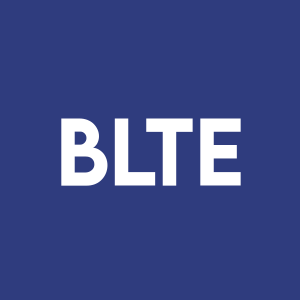Belite Bio Reports First-Quarter 2024 Financial Results and Provides Corporate Update
Rhea-AI Summary
Belite Bio (NASDAQ: BLTE) announced its Q1 2024 results and provided a corporate update. The company highlighted positive data from its Phase 2 trial of Tinlarebant in STGD1 patients, showing sustained lower atrophic lesion growth. Tinlarebant is also being evaluated in ongoing Phase 3 trials (DRAGON and PHOENIX) for STGD1 and GA, respectively. Interim data from these trials are expected in Q4 2024. Financially, Belite raised $25 million through a direct offering and reported a net loss of $7.9 million for Q1 2024, up from $6.9 million in Q1 2023. The company held $95.5 million in cash and U.S. treasury bills as of March 31, 2024.
Positive
- Raised $25 million in April 2024 through a registered direct offering.
- Held $95.5 million in cash and U.S. treasury bills as of March 31, 2024.
- No FDA-approved treatments for STGD1 or GA, highlighting market potential.
- Tinlarebant showed promising Phase 2 results in STGD1 subjects.
- Initiated DRAGON II trial for STGD1 and ongoing PHOENIX trial for GA.
- Phase 3 DRAGON trial completed enrollment with 104 subjects.
Negative
- Increased net loss to $7.9 million in Q1 2024 from $6.9 million in Q1 2023.
- R&D expenses rose to $6.8 million in Q1 2024 from $5.7 million in Q1 2023.
- G&A expenses increased to $1.6 million in Q1 2024 from $1.2 million in Q1 2023.
News Market Reaction 1 Alert
On the day this news was published, BLTE gained 0.76%, reflecting a mild positive market reaction.
Data tracked by StockTitan Argus on the day of publication.
- Tinlarebant is Belite Bio’s orally administered tablet intended to slow disease progression in patients affected with Stargardt Disease (STGD1) and Geographic Atrophy (GA) in advanced Dry Age-related Macular Degeneration (Dry AMD)
- Data from a 24-month Phase 2 trial in adolescent STGD1 subjects showed a sustained lower atrophic lesion growth in Tinlarebant-treated subjects compared to ProgStar participants possessing similar baseline characteristics (aged ≤18 years) (p<0.001)
- In the Phase 2 trial, 5 of 12 subjects (
42% ) with known pathogenic ABCA4 mutations, no incident atrophic (DDAF) lesions were formed during the 24-month treatment period and no change in QDAF was observed
- A novel lesion size quantification method that can better detect atrophic lesions revealed 8 of 12 subjects with atrophic lesion involvement within the macula at baseline; growth of these lesions into the macula was halted during the second year
- Interim data from the pivotal global Phase 3 trial of Tinlarebant in adolescent STGD1 subjects (“DRAGON”) expected in 4Q 2024
- Initiated DRAGON II trial of Tinlarebant in adolescent STGD1 patients
- Pivotal global Phase 3 trial of Tinlarebant in GA subjects (“PHOENIX”) is ongoing
- Raised
$25 million in gross proceeds in a registered direct offering in April 2024
- Conference Call and Webcast Tuesday, May 14, 2024, at 4:30 p.m. ET
SAN DIEGO, May 13, 2024 (GLOBE NEWSWIRE) -- Belite Bio, Inc (NASDAQ: BLTE) (“Belite” or the “Company”), a clinical-stage biopharmaceutical drug development company focused on advancing novel therapeutics targeting degenerative retinal diseases that have significant unmet medical needs, today announced its financial results for the first quarter ended March 31, 2024 and provided a general business update.
“It has been a strong start to 2024 with the initiation of the DRAGON II trial and the recent closing of our
First Quarter 2024 Business Highlights and Upcoming Milestones:
Clinical Highlights
Tinlarebant (LBS-008) is designed to be an oral, potent, once daily retinol binding protein 4 (RBP4) antagonist that decreases RBP4 levels in the blood and reduces vitamin A (retinol) delivery to the eye without disrupting systemic retinol delivery to other tissues. Vitamin A is critical to normal vision but can accumulate as toxic byproducts in individuals affected with STGD1 and GA (the advanced form of Dry AMD) leading to retinal cell death and loss of vision.
- Stargardt disease (STGD1): Accumulation of cytotoxic vitamin A byproducts (bisretinoids) has been implicated in the onset and progression of STGD1. Tinlarebant has been granted Fast Track and Rare Pediatric Disease (RPD) designations by the U.S. Food and Drug Administration (FDA), and orphan drug designation (ODD) in the U.S., Europe, and Japan for STGD1. There are currently no FDA approved treatments for STGD1.
- LBS-008-CT02 trial: Completed, open label, 24-month Phase 2 trial in adolescent STGD1 subjects and presented end of trial data at the AAO annual meeting in November 2023 and additional analysis at ARVO 2024
- Tinlarebant was safe and well tolerated with no withdrawals due to adverse events
- The 24-month data showed a sustained lower atrophic lesion growth in Tinlarebant-treated subjects compared to ProgStar participants possessing similar baseline characteristics (aged ≤18 years) (p<0.001)
- In 5 of 12 subjects (
42% ) with known pathogenic ABCA4 mutations, no incident atrophic (DDAF) lesions were formed during the 24-month treatment period and no change in QDAF was observed - A novel lesion size quantification method that can better detect atrophic lesions revealed 8 of 12 subjects with atrophic lesion involvement within the macula at baseline; growth of these lesions into the macula was halted during the second year
- Visual acuity was stabilized in the majority of subjects during the trial with a mean loss of five letters following 24 months of treatment (a loss of <10 letters is not considered clinically significant)
- In 6 subjects with prior bilateral BCVA loss (mean ~10 letters/year), mean BCVA loss over 24 months was 1.9 letters/year
- Sibling subjects with identical ABCA4 mutations showed different rates of QDAF/DDAF lesion growth and BCVA loss
- Additional analysis of visual acuity loss, genotypic profiles, and retinal imaging data provides further support for the potential of Tinlarebant to slow and potentially halt lesion growth
- LBS-008-CT02 trial: Completed, open label, 24-month Phase 2 trial in adolescent STGD1 subjects and presented end of trial data at the AAO annual meeting in November 2023 and additional analysis at ARVO 2024
-
- DRAGON Trial: Ongoing, 24 month, randomized (2:1, active: placebo), double-masked, placebo-controlled, global, multi-center, pivotal Phase 3 trial in adolescent STGD1 subjects
- Completed enrollment with 104 subjects in 11 countries
- Primary efficacy endpoint is slowing of atrophic lesion growth rate; safety and tolerability will also be assessed
- Interim data expected in 4Q 2024
- DRAGON Trial: Ongoing, 24 month, randomized (2:1, active: placebo), double-masked, placebo-controlled, global, multi-center, pivotal Phase 3 trial in adolescent STGD1 subjects
-
- DRAGON II Trial: Combination of Phase 1b open-label trial to evaluate the pharmacokinetics and pharmacodynamics of Tinlarebant in Japanese adolescent STGD1 subjects and a Phase 2/3, double-masked, placebo-controlled, multicenter, trial in adolescent STGD1 subjects
- Approximately 60 subjects, aged 12 to 20 years old, including approximately 10 Japanese subjects, are targeted for enrollment in the Phase 2/3 portion of the trial with a 1:1 randomization. The data from Japanese subjects is intended to facilitate future NDA applications in Japan
- Initiated in Japan, the U.S., and the U.K.
- Primary efficacy endpoint is slowing of atrophic lesion growth rate; safety and tolerability will also be assessed
- DRAGON II Trial: Combination of Phase 1b open-label trial to evaluate the pharmacokinetics and pharmacodynamics of Tinlarebant in Japanese adolescent STGD1 subjects and a Phase 2/3, double-masked, placebo-controlled, multicenter, trial in adolescent STGD1 subjects
- Geographic Atrophy (GA): GA, the advanced form of dry AMD, is a chronic degenerative disease of the retina that leads to blindness in the elderly. Accumulation of toxic vitamin A byproducts (bisretinoids) has been implicated in the progression of GA. There are currently no FDA approved, orally administered treatments for GA.
- PHOENIX Trial: Ongoing, 24-month, randomized (2:1, active: placebo; n~430 subjects), double-masked, placebo-controlled, global, multi-center, pivotal Phase 3 trial in patients with GA
- Primary efficacy endpoint is slowing of atrophic lesion growth rate; safety and tolerability will also be assessed
- Has enrolled 99 subjects
- Interim data expected at mid-point of the trial
- PHOENIX Trial: Ongoing, 24-month, randomized (2:1, active: placebo; n~430 subjects), double-masked, placebo-controlled, global, multi-center, pivotal Phase 3 trial in patients with GA
Corporate Highlights
- For the three months ended March 31, 2024, raised
$12.5 million from the exercise of the warrants issued in the Follow-on Offering and ATM Offering.
- On April 25, 2024 announced
$25 million Registered Direct Offering, with the purchase and sale of up to an aggregate of 651,380 American Depositary Shares of the Company (“ADSs”), each ADS representing one ordinary share of the Company, at a purchase price of$38.38 per ADS, and the warrants to purchase up to an aggregate of 651,380 ADSs, which will have an initial exercise price equal to$44.14 per ADS and will be immediately exercisable and expire on the five-year anniversary of the issuance.
First Quarter 2024 Financial Results:
Current Assets:
As of March 31, 2024, the Company had
R&D Expenses:
For the three months ended March 31, 2024, research and development expenses were
G&A Expenses:
For the three months ended March 31, 2024, general and administrative expenses were
Net Loss:
For the three months ended March 31, 2024, the Company reported a net loss of
Webcast Information
Belite Bio will host a webcast on Tuesday, May14, 2024, at 4:30 p.m. Eastern Time to discuss the Company’s financial results and provide a business update. To join the webcast, please visit https://wsw.com/webcast/cc/blte3/1420956. A replay will be available for approximately 90 days following the event.
About Belite Bio
Belite Bio is a clinical-stage biopharmaceutical drug development company focused on advancing novel therapeutics targeting retinal degenerative eye diseases which have significant unmet medical needs such as (i) atrophic age-related macular degeneration (AMD), commonly known as Geographic Atrophy (GA) in advanced dry AMD, and (ii) autosomal recessive Stargardt disease type 1, or STGD1, in addition to specific metabolic diseases. For more information, follow us on Twitter, Instagram, LinkedIn, Facebook, or visit us at www.belitebio.com.
Important Cautions Regarding Forward Looking Statements
This press release contains forward-looking statements about future expectations and plans, as well as other statements regarding matters that are not historical facts. These statements include but are not limited to statements regarding the potential implications of clinical data for patients, and Belite Bio’s advancement of, and anticipated preclinical activities, clinical development, regulatory milestones, and commercialization of its product candidates, and any other statements containing the words “expect”, “hope”, and similar expressions. Actual results may differ materially from those indicated in the forward-looking statements as a result of various important factors, including but not limited to Belite Bio’s ability to demonstrate the safety and efficacy of its drug candidates; the clinical results for its drug candidates, which may not support further development or regulatory approval; the timing to complete relevant clinical trials and/or to receive the interim/final data of such clinical trials; the content and timing of decisions made by the relevant regulatory authorities regarding regulatory approval of Belite Bio’s drug candidates; the potential efficacy of Tinlarebant, as well as those risks more fully discussed in the “Risk Factors” section in Belite Bio’s filings with the U.S. Securities and Exchange Commission. All forward-looking statements are based on information currently available to Belite Bio, and Belite Bio undertakes no obligation to publicly update or revise any forward-looking statements, whether as a result of new information, future events or otherwise, except as may be required by law.
| BELITE BIO, INC | ||||||||
| UNAUDITED CONDENSED CONSOLIDATED STATEMENTS OF OPERATIONS AND COMPREHENSIVE LOSS | ||||||||
| (Amounts in thousands of US Dollars, except share and per share amounts) | ||||||||
| For the Three Months | ||||||||
| Ended March 31, | ||||||||
| 2023 | 2024 | |||||||
| Expenses | ||||||||
| Research and development | 5,723 | 6,765 | ||||||
| General and administrative | 1,158 | 1,563 | ||||||
| Total operating expenses | 6,881 | 8,328 | ||||||
| Loss from operations | (6,881 | ) | (8,328 | ) | ||||
| Other income (expense): | ||||||||
| Total other (expense) income, net | (8 | ) | 463 | |||||
| Loss before income tax | (6,889 | ) | (7,865 | ) | ||||
| Income tax expense | 6 | 6 | ||||||
| Net loss | (6,895 | ) | (7,871 | ) | ||||
| Other comprehensive income (loss) | ||||||||
| Foreign currency translation adjustments, net of nil tax | 16 | (96 | ) | |||||
| Total comprehensive loss | $ | (6,879 | ) | (7,967 | ) | |||
| Weighted average number of ordinary shares used in per share calculation: | ||||||||
| - Basic and Diluted | 20,950,240 | 29,677,173 | ||||||
| Net loss per ordinary share | ||||||||
| - Basic and Diluted | $ | (0.33 | ) | (0.27 | ) | |||
| BELITE BIO, INC | ||||||||
| UNAUDITED CONDENSED CONSOLIDATED BALANCE SHEETS | ||||||||
| (Amounts in thousands of US Dollars, except share amounts) | ||||||||
| December 31, | March 31, | |||||||
| 2023 | 2024 | |||||||
| Current assets | $ | 89,940 | $ | 96,468 | ||||
| Other assets | 4,702 | 4,679 | ||||||
| TOTAL ASSETS | $ | 94,642 | $ | 101,147 | ||||
| TOTAL LIABILITIES | $ | 4,211 | $ | 4,677 | ||||
| TOTAL SHAREHOLDERS’ EQUITY | 90,431 | 96,470 | ||||||
| TOTAL LIABILITIES AND SHAREHOLDERS’ EQUITY | $ | 94,642 | $ | 101,147 | ||||
| Ordinary shares authorized | 400,000,000 | 400,000,000 | ||||||
| Ordinary shares issued | 29,184,475 | 29,802,332 | ||||||
| Ordinary shares outstanding | 29,149,444 | 29,794,433 | ||||||
Media and Investor Relations Contact:
Jennifer Wu /ir@belitebio.com
Julie Fallon /belite@argotpartners.com









